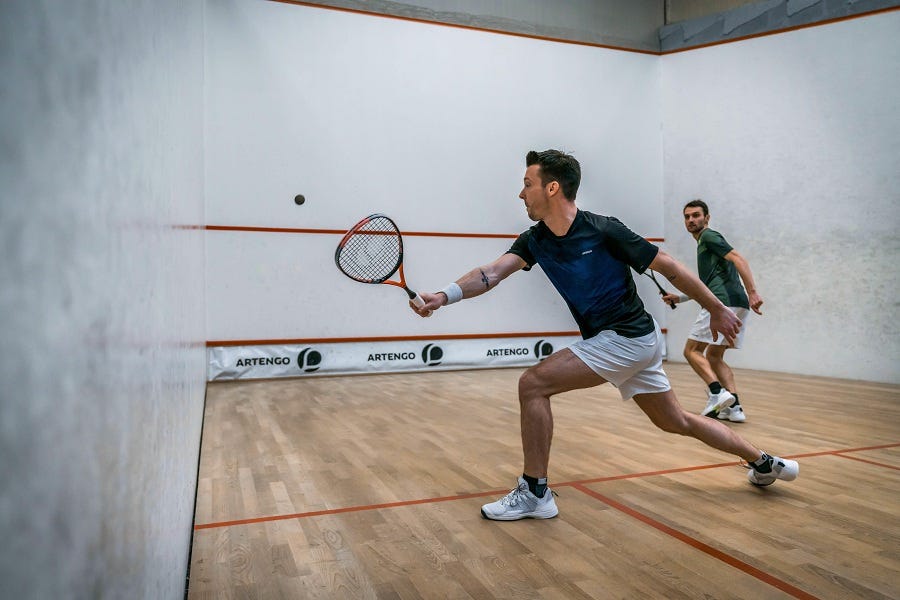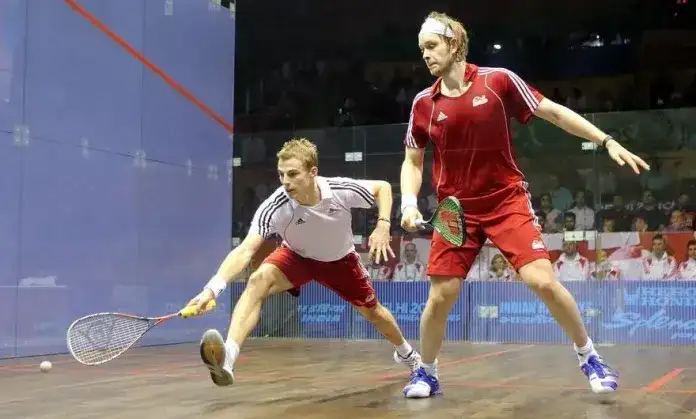Squash is one of the most physically demanding and exhilarating racquet sports in the world. Played in a four-walled court, it requires not only agility, speed, and endurance but also mental sharpness and strategic thinking. The game's unique combination of high-paced action and tactical maneuvering has made it a favorite among athletes looking for an intense workout that pushes their limits both physically and mentally. Despite being less globally popular than sports like tennis or football, squash has a passionate following, particularly in countries like England, Egypt, and Pakistan.
This 600-word description delves into the fast-paced nature of squash, the skills it requires, and why it continues to challenge players of all levels.

The Basics of Squash
Squash is played between two players (singles) or four players (doubles) inside a closed court with a small rubber ball and racquets. The goal of the game is simple: hit the ball against the front wall in such a way that the opponent cannot return it before it bounces twice on the floor. What makes squash particularly intense is the enclosed nature of the court. Unlike tennis, where players are separated by a net and have ample space to cover, squash requires players to be in constant motion in a relatively confined area. The ball can bounce off the side walls, back wall, and front wall, making it a highly dynamic and unpredictable game.
The squash ball, which is smaller than a tennis ball and made of rubber, also contributes to the sport's intensity. The ball's low bounce means that players have to cover a lot of ground quickly to retrieve it. As the rally continues, the ball warms up and bounces slightly higher, adding to the speed and excitement of the game.

The Physical Demands of Squash
One of the defining characteristics of squash is its physical intensity. Squash players are constantly on the move, often sprinting short distances and changing direction rapidly to reach the ball. This requires a high level of cardiovascular fitness as well as explosive strength in the legs to accelerate and decelerate quickly. Players must be able to react instantly, anticipating their opponent’s moves and responding with their own shot, all while maintaining balance and control.
Squash is not just about speed, though. The game's quick pace forces players to develop incredible endurance and stamina. A match can last anywhere from 20 minutes to over an hour, depending on the level of play and how closely matched the opponents are. During that time, players can burn as many calories as they would in a long-distance run, making squash one of the best sports for cardiovascular health.

The sport also demands strength and flexibility. The repetitive lunging and squatting movements required to reach the ball put a significant strain on the legs and core muscles. Additionally, the need to twist and stretch to hit shots from different angles works the upper body and improves overall flexibility.
Mental Toughness and Strategy
Beyond the physical challenges, squash is also a game of mental sharpness. Players must think several steps ahead, predicting their opponent’s next move and positioning themselves accordingly. A successful squash player knows how to control the pace of the game, alternating between fast, aggressive shots and softer, defensive ones. They must also be adept at using the entire court, forcing their opponent into difficult positions while keeping themselves in the center of the action.

The mental stamina required to maintain focus and make quick decisions during long rallies is immense. Unlike some sports where there are pauses between plays, squash is continuous, leaving little time for players to gather their thoughts. The ability to stay composed under pressure, particularly during a close match, is a hallmark of a skilled squash player.
Why Squash Remains Challenging
The combination of physical and mental demands makes squash one of the most challenging sports to master. Its fast-paced nature means that even a momentary lapse in concentration can result in losing a point. Players must not only be in peak physical condition but also possess the mental fortitude to keep pushing forward, even when fatigued.

For newcomers, the steep learning curve can be intimidating. It takes time to develop the reflexes, footwork, and strategy needed to compete at a high level. However, for those who enjoy a fast-paced, intense workout, squash offers a rewarding experience. The satisfaction of outmaneuvering an opponent with a well-placed shot or winning a long, grueling rally is unparalleled.
At the professional level, squash tournaments showcase the best of the best in terms of athleticism and skill. Players like Egypt’s Ali Farag and Nour El Sherbini have dominated the sport, demonstrating the high level of excellence that can be achieved with dedication and training.

Conclusion
Squash is a sport that challenges players in every way—physically, mentally, and strategically. Its fast-paced nature, combined with the need for quick thinking and endurance, makes it one of the most demanding racquet sports in the world. Whether you're a beginner looking for a new challenge or an experienced player aiming to improve your skills, squash offers an intense and rewarding experience that few sports can match. The next time you step into the court, be prepared to move fast, think faster, and push yourself to new limits.







